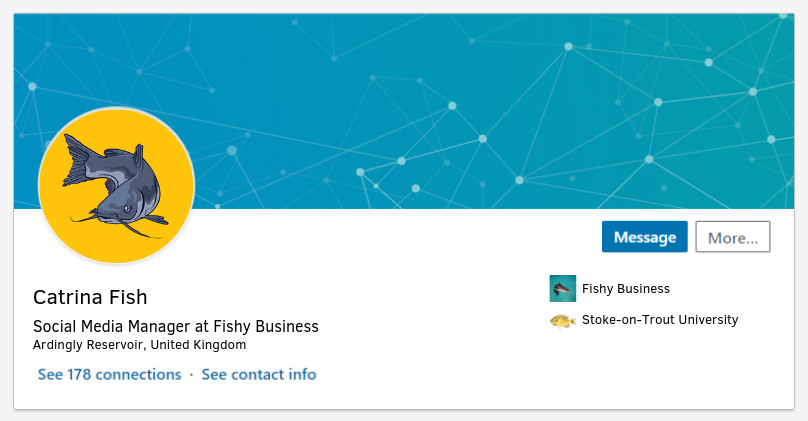Are you accidentally Catfishing your future employer?
What’s a ‘Catfish’?
‘Catfish’ is a term that describes a person who creates a fake identity on social media platforms, usually with a deceptive intention. It happens more often than you might think! We’ve all seen the TV Show where Nev Schulman and Max Joseph travel around the US with hopeless romantics to track down the Catfish they’ve fallen in love with over the internet… Right?
Why’s it called ‘Catfishing’?
In the original movie Catfish, which inspired the TV show and the slang phrase, Nev is seen speaking to his Catfish’s husband who says:
“They used to tank cod from Alaska all the way to China. They’d keep them in vats in the ship. By the time the codfish reached China, the flesh was mush and tasteless. So, this guy came up with the idea to put some catfish in with them and the Catfish will keep the cod agile. And there are those people who are Catfish in life, they keep you on your toes. They keep you guessing, they keep you thinking, they keep you fresh…”

Am I catfishing potential employers on LinkedIn?
Without knowing it, you might be putting recruiters and hiring managers off because of your LinkedIn profile. Here are five things you should avoid doing to improve the quality of your LinkedIn profile and overall job search.
Missing profile photo
Is your profile missing a headshot? Or worse, when you do a quick image reverse search, does it come up with thousands of results? Was it taken 15 years ago when you first graduated university? As a job seeker, you’ll want to keep your profile photo up to date to avoid people thinking you are someone you’re not.
Can’t make that video call
In a dating scenario, Catfish ALWAYS seem to have broken front cameras or no access to a webcam. In a job seeking sense, being unavailable for a phone or skype interview multiple times could raise some questions as to what kind of person you are. Are you just unorganised or are you hiding something?
Gaps in your story
Having gaps in your employment history will make any hiring manager wonder ‘Well, where have you been? What have you been doing in that time? Have you been travelling or spending some time in prison?’ There’s probably a simple explanation as to where you have been all this time so it’s always best to not leave people guessing!
Being a ghost on other social media platforms
What does the rest of your online presence say about you? Are you on other social media sites? Does your information match across networks? Do you interact with real people online? I don’t mean you have to share all of your information on every social channel, but make sure if an employer is going to look you up, you can be found and seen as an engaged, active professional with a real connection list.
Telling vague, far-fetched stories
Is your employment history full of amazing achievements, success stories and wins with no evidence to back it up? *shouts* ‘CATFISH ALERT’!
Hiring managers love to hear about your achievements, and your CV should showcase them, but make sure you use examples that you can back up. Statistics; a client recommendation; campaign results data; a screenshot from Google Analytics; anything that can prove you did all of the amazing things mentioned on your LinkedIn profile and CV.
To put it simply, make sure your CV and LinkedIn profile are up to date and truthful. Employers will usually do their homework by Googling and looking you up on social media. If their gut tells them you aren’t trustworthy, you won’t be invited to an interview.
Looking for more job seeking tips? We’ve got you covered:
💡 How to Find a New Job Without Your Boss Finding Out
💡 Think you’re under-qualified? So what!
💡 How To Find A New Job on TikTok
If you’re looking for some expert advice or help with your CV, get in touch, we offer free CV critiques for all UK based Digital Marketers, but sorry, no Catfish allowed! You can find the latest genuine digital job opportunities over on our job board.
